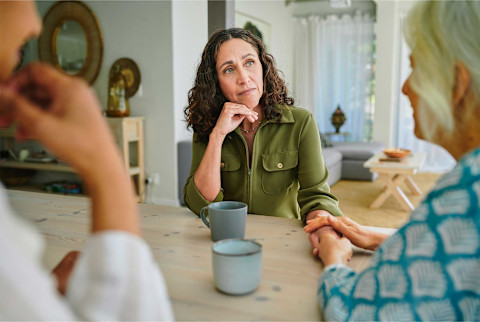This Is The #1 Killer Of Women, But We Don't Talk About It Enough

Heart disease is the leading cause of death among women 1in the United States, yet it remains significantly underrepresented in both attention and advocacy.
To come, what award-winning physician and oncologist Elizabeth Comen, M.D., shared on this crucial topic during a recent episode of the mindbodygreen podcast. Plus, the symptoms every woman should know.
Why women's heart disease needs more advocacy
"We are still playing catch-up in terms of understanding how women present with heart disease," Comen says.
"When I was in medical school, we were taught that women's symptoms of heart attack were atypical. That's absolutely ridiculous—to teach students and future doctors that the way women present is the atypical version of how men present, when it is the number one killer of women," she says.
Comen explains that women have distinct biology when it comes to heart disease. "A lot of what we present with is more small vessel disease, which is different to visualize than what you might see in a man. So there's a lot of work that needs to be done, not just in research but also in terms of who has a seat at the table and who the doctors are that treat patients."
Reflecting on the situation, the lack of heart disease research specifically focused on women often leads to missed diagnoses, directly costing lives. We need to understand the unique signs of heart disease in women rather than assuming they mirror those in men or deeming them "abnormal."
The symptoms to know
The traditional heart disease symptoms we often discuss—like the sensation of an elephant sitting on your chest—don't always apply to women. Comen points out that women's symptoms can be starkly different and oftentimes harder to spot.
Women with heart disease are more likely to experience symptoms such as:
- Unexplained fatigue
- Jaw pain
- Indigestion
- Shortness of breath
- Palpitations (especially postmenopause)
- A negative shift in exercise tolerance
So there you have it—there are patterns; they just don't match the male blueprint.
Because many of these symptoms overlap with other diseases and health conditions, it's crucial for women to consult their primary care physician when a symptom arises, even if they suspect it's nothing.
What's more, "If a woman has any history of heart disease in the family that they know of, any sudden death, any early onset stroke, any history of blood clots, it's very important that they talk to their doctor about a family history that may impact their future presentation of disease," she says.
On a larger scale, we need to make sure women know and feel comfortable speaking up about their pain and discomfort.
"There is a narrative about women enduring pain, feeling like they have to tough things out, taking care of other people, and setting themselves on fire just to keep everybody else around them warm," Comen says, adding, "I'm guilty of this myself, and we need to allow the space in our society for women to be able to take care of themselves."
This means listening when women speak up about their health, completing extensive research so we can properly diagnose diseases when symptoms arise, and empowering them to take control of their health. We're doing better than we have in the past, Comen says, but we still have a long way to go.
The takeaway
Heart disease is the leading cause of death for women, yet we view their symptoms as sporadic and atypical. According to Comen, there are most definitely patterns in women's heart disease symptoms; they're just different from those of men. In order to save lives and work toward garnering advocacy for women's heart disease, we must talk about the symptoms and empower women to speak up when they know something isn't right.
If you want to dive deeper into the shocking history of women's health, tune into the latest episode. You can watch on YouTube or listen in on Apple Podcasts.
